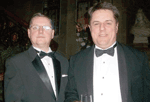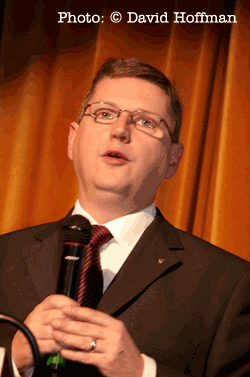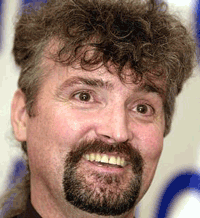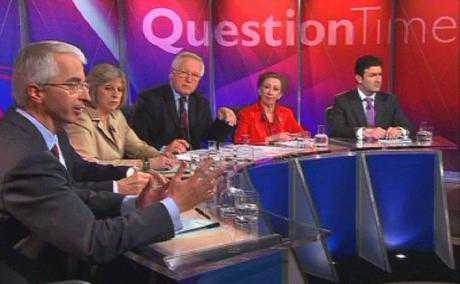Jim Dowson: How a militant anti-abortionist took over the BNP. Part I of a three part investigation.
Through the keyhole

Today we start a serialisation from the current issue of Searchlight Magazine which features a special investigation into the heart of the BNP. We highlight the organisational set-up, the secret locations and the people running the fascist party. We expose how the running of the party has been outsourced to a rabid Loyalist anti-abortionist in Belfast and we reveal that this man is receiving European Union money for peace and reconciliation.
We have also been busy working with the media. Many of the revelations and exposés we have read in the newspapers over the past few weeks have originated from Searchlight.
Forty-seven years after Searchlight was first formed we are proving that we are still ahead of the game.
From rags to riches
By Gerry Gable
Ten years ago Jim Dowson (pictured) was a down-at-heel anti-abortion campaigner and hardline Protestant, who had marched with a loyalist band that played songs in praise of the convicted loyalist murderer Michael Stone (pictured below).

His luck changed when he formed an alliance with Justin Barrett, a far-right Catholic lawyer and leader of the notorious Irish anti-abortion group Youth Defence, which had previously stormed buildings in Dublin in their crusade against a woman’s right to choose. In 2000 Barrett had attended a rally of the German nazi National Democratic Party, where he met Roberto Fiore, the Italian fascist friend and mentor of Nick Griffin, the BNP leader. The trip was arranged by Derek Holland, one of Griffin’s old colleagues from the days of the National Front Political Soldiers.
Barrett attracted attention as the lead spokesperson of the successful Irish campaign against the Nice Treaty in 2001 and money started to flow from far-right anti-abortionists in the United States.
In 1999 Dowson had formed Precious Life Scotland and it was through cooperation between his group and Youth Defence that he met Barrett. The link proved beneficial when Barrett pitched £50,000 into Dowson’s organisation to pay for the production of anti-abortion CDs and video tapes to be distributed to schools and churches in Northern Ireland and Scotland.
Dowson was a “rent-a-cause” extremist who had been kicked out of the Orange Order. He has a list of criminal convictions including breach of the peace in 1986, possession of a weapon and breach of the peace in 1991 and criminal damage in 1992. Although a Protestant, he was happy to sell thousands of photographs of the Pope at inflated prices to Catholics in the Irish Republic.
Barrett faded from the public arena after the Nice Treaty vote was rerun and went the other way. His political demise was hastened after the publication of his book The National Way Forward, in which he described immigration as “genocidal”. He also became increasingly antisemitic, influenced by the nazi leaders he had met in Germany.
In contrast, Dowson’s campaigning activities grew. He turned his sights on gay people and encouraged his followers to abuse and threaten people who attended or worked in abortion clinics.
This resulted in Dowson parting company with some of his Precious Life fellow activists, but he was now in a financial position to go it alone, turning his faction into the UK LifeLeague. He never looked back.
Dowson, 45, started working with the British National Party late in 2007, and he quickly revolutionised its fundraising. His first appeal, launched at the time the BNP was tearing itself apart in an internal rebellion, was carried out as a free sample to show the party what he could do, but since then he has worked on a percentage commission.
His work for the BNP grew to encompass the provision of manage-ment training in Spain and revamping the party’s administration. Early in 2009 he set up the Belfast call centre, piggybacking it on his successful fundraising for the LifeLeague, thereby cutting costs and perhaps giving doubtful BNP officers the impression of a larger operation than it actually is.
Over the past two years he has clearly raised huge sums for the party, although it remains financially strapped. Partly this is the result of scams, such as the truth truck, which Griffin claimed had been bought with thousands of pounds of supporters’ donations. It turned out still to belong to Dowson’s private company, Adlorries.com, and, like much of the other equipment the BNP claimed to have bought, it was only leased by the party.
Today Dowson practically owns the BNP, which he briefly joined to placate his critics but left as soon as the heat was off him. He remains at loggerheads with many senior party officers and employees. One, whom he sacked in spring, is heading for an employment tribunal.

Griffin’s claim that the BNP is being flooded with donations via Dowson’s call centre is a lie. Income is down to a trickle and membership is a mere 8,000 or so. People are not queuing up to join after the end of the three-month moratorium on membership, they are leaving in droves, especially since the latest membership list leak from Dowson’s Belfast bunker.
All this comes on top of the party’s forced climbdown over its racist constitution, the non-appearance of its 2008 accounts and concern over the number of senior party officers who have been put on the European Parliament payroll as staff of the two BNP MEPs.
Hope Not Hate





